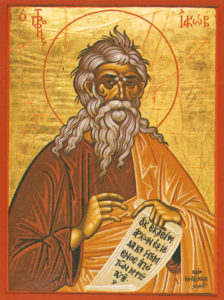22 March OS 2017: Tuesday of the Sixth Week of Lent; Holy Hieromartyr Basil of Ankyra
The first reading at Vespers today is Genesis 31:3-36, which concludes the history of Jacob’s winning his two wives and becoming a wealthy man with a large family and household.
In fourteen years, God has given Jacob both domestic happiness and material success, despite all the efforts of Laban, his crafty father-in-law, to cheat him. The LORD has demonstrated, once again, that man’s cleverness is powerless against His wisdom and His will. God willed to make Jacob a great patriarch in His plan of salvation for mankind, and He has acted according to His will.
Jacob’s new status as a great householder gives him what today we call “financial freedom”: he is his own master, not beholden to an employer or creditor who can take the bread out of his mouth at any moment. Now God alone, the Master of wind, weather, the tides of warring nations, and the health of man and beast, will give or take away his prosperity. He has obtained his freedom, however, not by going around or against God’s will, but by fulfilling it. He has done his part in the plan of salvation; he has conformed his will to the will of God.
Jacob’s earthly wealth provides a typos, a prophetic image, of the true wealth the Lord wants to give us, new and permanent properties of soul and body, gifts of His uncreated grace: pure prayer, harmony with God’s creation, lasting peace of heart – all the joys of friendship with God. Jacob’s earthly freedom provides a prophetic image of the eternal freedom God intends for us, the freedom of the sons of God: freedom from sin, the devil, death, and hell. We must conform our wills to the will of God, and we will become free.
A fatally mistaken idea about freedom grips the minds of men, who equate freedom with the ability to disobey God and get away with it. They want to make their own rules and create their own reality. It does not seem to occur to them that the further they go in this direction, the more miserable they become. This present misery only faintly presages what is in store for them. What is doubtless going to happen to them after they die, apart from an unrevealed miracle of God’s mercy upon which no one can rely, is something we cannot – and would prefer not – to imagine.
Mentored by Satan, men mistakenly imagine that the ability to do evil and not suffer thereby is inherent in having a will, in being free and rational creatures, but it is not. Our natural will is most free, is itself, when conformed completely to God’s will; we are most ourselves, most free, most rational, and possessed of will in its ultimate degree, when we do God’s will at every moment. What men mistakenly call “free will” is what St. Maximus the Confessor identifies as the “gnomic” will – a diseased condition of the will based on ignorance, conflicting opinions, and moral weakness, the result of the Fall. It is this condition of the will that we experience every day when our choice wavers between good and evil, between God’s Law and the law of sin and death.
We overcome the stress and misery of this wavering, uncertain state by unrelenting work on ourselves. Yes, we obtain the glorious freedom of the sons of God by God’s gift, but also we must labor. We find an example in Jacob, who did indeed receive all as gift from God but also was not idle. Last week we recalled his labors while chanting the Great Canon:
In privation Jacob the Patriarch endured the burning heat by day and the frost by night, making daily gains of sheep and cattle, shepherding, wrestling, and serving, to win his two wives.
By the two wives, understand action and knowledge in contemplation. Leah is action, for she had many children; and Rachel is knowledge, for she endured great toil. And without toil, O my soul, neither action nor contemplation will succeed. – Ode Four of the Great Canon of St. Andrew of Crete
May the sweetness of Holy Pascha that we will soon enjoy give us a taste of the eternal wealth and freedom that cannot be taken away. May it encourage us to serve the Lord in active virtue and find rest in Him through prayer.
Let us conform our wills to His holy, peaceful, and perfect will, and we will find glorious rest, the freedom of the sons of God.

